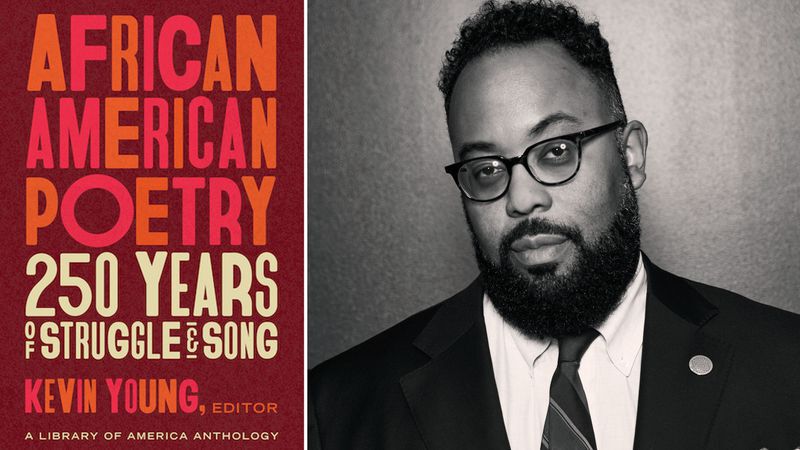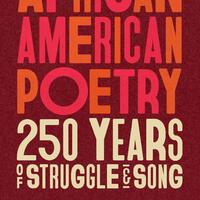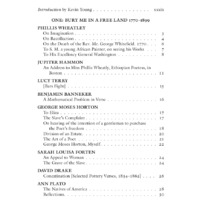African American Poetry: 250 Years of Struggle & Song
Item
-
Title
-
African American Poetry: 250 Years of Struggle & Song
-
This edition
-
"African American Poetry: 250 Years of Struggle & Song." Ed. Kevin Young. New York: Library of America, 2020. 1,170 pp.
-
Table of contents
-
Full table of contents (PDF) of the 670 poems in the anthology is attached under "other media" (below). Below is an alphabetical list of the poets included in the volume:
Chris Abani
Hanif Abdurraqib
Elizabeth Acevedo
Ai
Elizabeth Alexander
Lewis Grandison Alexander
Will Alexander
Samuel Allen (aka Paul Vesey)
Maya Angelou
Russell Atkins
Cameron Awkward-Rich
Benjamin Banneker
Amiri Baraka (LeRoi Jones)
George Barlow
Gerald Barrax
Quan Barry
Paul Beatty
James Madison Bell
Gwendolyn B. Bennett
Joshua Bennett
Reginald Dwayne Betts
Arna Bontemps
Kamau Brathwaite
William Stanley Braithwaite
Gwendolyn Brooks
Jericho Brown
Sterling A. Brown
Mahogany L. Browne
Julia de Burgos
Darrell Burton
Olivia Ward Bush
Cyrus Cassells
Barbara Chase-Riboud
Dominique Christina
Benjamin Clark
Tiana Clark
Carrie Williams Clifford
Lucille Clifton
Anita Scott Coleman
Wanda Coleman
Sam Cornish
James D. Corrothers
Jayne Cortez
Joseph Seamon Cotter, Jr.
Joseph Seamon Cotter, Sr.
Mae V. Cowdery
Countee Cullen
Waring Cuney
Pierre Dalcour
DéLana R. A. Dameron
Margaret Danner
Kyle Dargan
Frank Marshall Davis
Kwame Dawes
Clarissa Scott Delany
Toi Derricotte
Joel Dias-Porter (aka DJ Renegade)
Ralph Dickey
LaTasha N. Nevada Diggs
Melvin Dixon
Owen Dodson
Rita Dove
David Drake
W.E.B. Du Bois
Henry Dumas
Paul Laurence Dunbar
Alice Dunbar-Nelson
Camille Dungy
Cornelius Eady
Thomas Sayers Ellis
Mari Evans
Eve L. Ewing
Sarah Webster Fabio
Jessie Redmon Fauset
Julia Fields
Nikky Finney
Calvin Forbes
Sarah Louisa Forten
Vievee Francis
Ross Gay
Christopher Gilbert
Nikki Giovanni
Aracelis Girmay
C. S. Giscombe
Lorna Goodison
Rachel Eliza Griffiths
Angelina Weld Grimké
Charlotte Forten Grimké
Nicolás Guillén
Forrest Hamer
Jupiter Hammon
Frances Ellen Watkins Harper
Michael S. Harper
Duriel E. Harris
Walter Everette Hawkins
Robert Hayden
Terrance Hayes
Josephine D. Heard
Essex Hemphill
David Henderson
Safiya Henderson-Holmes
Calvin Hernton
Sean Hill
Harmony Holiday
Frank Horne
George Moses Horton
Langston Hughes
Erica Hunt
Ishion Hutchison
Gary Jackson
Major Jackson
Honorée Fannone Jeffers
Tyehimba Jess
Eva A. Jessye
Ted Joans
Fenton Johnson
Georgia Douglas Johnson
Helene Johnson
James Weldon Johnson
Gayl Jones
Patricia Spears Jones
Saeed Jones
A. Van Jordan
June Jordan
Allison Joseph
Bob Kaufman
Douglas Kearney
John Keene
Sybil Kein
Donika Kelly
Dolores Kendrick
Keorapetse Kgositsile
Etheridge Knight
Yusef Komunyakaa
Pinkie Gordon Lane
Armand Lanusse
Rickey Laurentiis
Danielle Legros Georges
Robin Coste Lewis
Audre Lorde
Nathaniel Mackey
Haki Madhubuti (Don L. Lee)
Clarence Major
George R. Margetson
Mariposa (aka María Teresa Fernández)
Dawn Lundy Martin
Adrian Matejka
Agnes Maxwell-Hall
Shara McCallum
Shane McCrae
Colleen J. McElroy
Claude McKay
Tony Medina
Anis Mojgani
Aja Monet
Myra Estelle Morris
Tracie Morris
Thylias Moss
Fred Moten
Harryette Mullen
John Murillo
Pauli Murray
Larry Neal
Marilyn Nelson
Richard Bruce Nugent
Gloria C. Oden
Myron O’Higgins
Brenda Marie Osbey
Gregory Pardlo
Morgan Parker
Raymond R. Patterson
Willie Perdomo
Carl Phillips
Rowan Ricardo Phillips
Pedro Pietri
Oliver Pitcher
Lucia Mae Pitts
Ann Plato
Sterling D. Plumpp
Esther Popel
N. H. Pritchard
Khadijah Queen
Dudley Randall
Camille Rankine
Claudia Rankine
Henrietta Cordelia Ray
Andy Razaf
Charles L. Reason
Ishmael Reed
Justin Phillip Reed
Roger Reeves
Victor-Ernest Rillieux
Ed Roberson
Carolyn Rodgers
Allison C. Rollins
Kate Rushin
Sonia Sanchez
Gil Scott-Heron
Nicole Sealey
Tim Seibles
Chanif Shanahan
Ntozake Shange
Reginald Shepherd
Evie Shockley
Safiya Sinclair
Clint Smith
Danez Smith
Lucy E. Smith
Patricia Smith
Tracy K. Smith
A. B. Spellman
Anne Spencer
Primus St. John
Sharan Strange
Sekou Sundiata
Lucy Terry
Camille Thierry
Lorenzo Thomas
Eloise Bibb Thompson
Priscilla Jane Thompson
Samantha Thornhill
Melvin B. Tolson
Jean Toomer
Natasha Trethewey
Quincy Troupe
Lyrae Van Clief-Stefanon
George B. Vashon
Derek Walcott
Alice Walker
Frank X. Walker
Margaret Walker
Anthony Walton
Lucian B. Watkins
Tom Weatherly
Afaa Michael Weaver
Phillis Wheatley
Simone White
James Monroe Whitfield
Albery Allson Whitman
Phillip B. Williams
Sherley Anne Williams
Saul Williams
Jamila Woods
Richard Wright
Al Young
Kevin Young
-
Publisher's description
-
From the publisher's website:
"‘‘For more than 250 years,” writes poet and scholar Kevin Young in his introduction to this landmark new anthology, “African Americans have written and recited and published poetry about beauty and injustice, music and muses, Africa and America, freedoms and foodways, Harlem and history, funk and opera, boredom and longing, jazz and joy.” Across a turbulent history, from such vital centers as Harlem, Chicago, Washington, D.C., Los Angeles, and the Bay Area, Black poets created a rich and multifaceted tradition that has been both a reckoning with American realities and an imaginative response to them. Capturing the power and beauty of this diverse tradition in a single indispensable volume, African American Poetry reveals as never before its centrality and its challenge to American poetry and culture.
One of the great American art forms, African American poetry encompasses many kinds of verse: formal, experimental, vernacular, lyric, and protest. The anthology opens with moving testaments to the power of poetry as a means of self-assertion, as enslaved people like Phillis Wheatley and George Moses Horton and activist Frances Ellen Watkins Harper voice their passionate resistance to slavery. Young’s fresh, revelatory presentation of the Harlem Renaissance reexamines the achievements of Langston Hughes and Countee Cullen alongside works by lesser-known poets such as Gwendolyn B. Bennett and Mae V. Cowdery. The later flowering of the still influential Black Arts Movement is represented here with breadth and originality, including many long out-of-print or hard-to-find poems.
Here are all the significant movements and currents: the nineteenth-century Francophone poets known as Les Cenelles, the Chicago Renaissance that flourished around Gwendolyn Brooks, the early 1960s Umbra group, and the more recent work of writers affiliated with Cave Canem and the Dark Noise Collective. Here too are poems of singular, hard-to-classify figures: the enslaved potter David Drake, the allusive modernist Melvin B. Tolson, the Cleveland-based experimentalist Russell Atkins. This Library of America volume also features biographies of each poet and notes that illuminate cultural references and allusions to historical events."
-
Reviews and notices of anthology
-
● Barajas, Joshua. "New Anthology Shares Black Poetry's History of 'Struggle and Song.'" "PBS News Hour" 25 Nov. 2020.
-
PBS News Hour
-
● San Francisco Chronicle:
"This thousand-page collection should be required reading for all Americans. . . . As a whole, it’s singularly comprehensive, and thrilling in its sheer variety. . . . There’s a beauty and inherent import to reading poets collected by era — it creates a conversation between the poet and her place in history, and demonstrates the political nature of even the most apolitical poem. . . . The collection is a who’s who and offers the best hits, while quietly working to “amend and expand the record"
-
● Seaman, Donna. Booklist:
"A defining, glorious, and invaluable anthology of African American poetry that reaches back to 1770 and concludes with today’s artistic flourishing in sync with Black Lives Matter. Vitality, beauty, anger, sorrow, humor, and hope all find original, resonant, and consummate expression throughout this expert gathering of works by both celebrated poets and many who will be new to readers, especially women and LGBTQ poets from earlier eras, and all 250 poets are succinctly profiled. Kevin Young provides a historical and literary framework in eight chronological sections, each discussed in substantial and enlightening detail in his elegantly composed and dynamic introduction. His coverage includes pivotal creative movements, including not only the Harlem Renaissance, but also the Chicago Renaissance, the Black Arts Movement, and such writing collectives as June Jordan’s Poetry for the People, Cave Canem, and the Dark Room Collective. In this powerhouse anthology, African American poets are clearly in dialogue with each other across generations, sustaining community. Written under siege both obvious and insidious, their poems engage with every aspect of life while tracking the ongoing quest for equality and justice. A profound and affirming pleasure to read and an imperative resource for every public library"
-
● Sehgal, Parul. "A Monumental and Rapturous New Anthology of Black American Poetry." "New York Times" 10 Nov. 2020.
"[Kevin Young's] many endeavors are linked by the effort to rescue from oblivion, to supply context, to indicate points of continuity while insisting on the multiplicity of experience. One of Young’s achievements with this new book, six years in the making, is in surfacing lesser-known writers — specifically women writers, like Anne Spencer and Mae V. Cowdery, forgotten figures of the Harlem Renaissance — and interrogating why their work went missing. Did they never publish a book? Did they live in a time, like the 1980s, with scant institutional support for Black poets? Did they write in trivialized forms? Were they forced to keep their writing secret?
Anthologies can be a stay against obscurity. Here are poems considered too taboo for their time (Angelina Weld Grimké’s ravishing love poems, written for another woman) or produced in forms considered marginal (Lucille Clifton’s jump rope rhymes, published here for the first time)."
The anthology is conventionally organized--"divided into chronological sections, organized alphabetically by author, for the most part"--but the poems nonetheless "slyly annotate one another." "One of the most moving aspects of the anthology is to see writers in earlier sections — Langston Hughes, Paul Laurence Dunbar, Gwendolyn Brooks, June Jordan — become beloved ancestors, become the occasion for poems in later sections."
Read through chronologically, "the book feels like a powerful volume of American history, in which poets beginning with Phyllis Wheatley, the country’s first published Black poet, comment on their times. Here is the potter David Drake, who, at a time when literacy was proscribed for enslaved people, inscribed his work with rhyming couplets about family separation in slavery (“I wonder where is all my relations / Friendship to all — and every nation”). Here is the birth of jazz, the Scottsboro trial, the murder of Emmett Till, the Vietnam War, the murder of Malcolm X, the killings of Michael Brown, Rekia Boyd, Sandra Bland."
"If this anthology reads like a form of history, it is also a history of form. It traces the tributaries of English and folk traditions, the rhythms of jazz and the Beats, the influence of modernism and the Black Arts Movement."
"The poem itself becomes a site to discuss the costs of transforming struggle into song, as Young puts it. Poets grapple with the urgency to document violence but also chafe at the compulsion. “This movie can’t be about black pain or cause black pain. / this movie can’t be about a long history of having a long history with hurt,” Danez Smith writes in “dinosaurs in the hood.”"
-
New York Times
-
● Whittington, Lew J. "New York Journal of Books" (undated)
-
New York Journal of Books
-
See also
-
● "Lift Every Voice: Why African American Poetry Matters"
-
Lift Every Voice
-
● Rockett, Darcel. "Kevin Young on Curating 250 Years of African American Poetry: 'So vital and rich that it can barely be contained.'" "Chicago Tribune" 31 Aug. 2020.
The anthology took six years to put together. When asked, "What do you hope the anthology achieves," Young responds that the poems collected here capture both "the history of African America" in its public facets as well as "daily life as African Americans": "African American poetry has always spoken on the lower frequencies, it’s always talked about day to day life, the blues, music and dancing, pleasure and pain — all the things that make up humanity. There’s a real tradition of speaking to people and meeting them where they live, and I hope this anthology does that."
-
Chicago Tribune
-
Item Number
-
A0529




